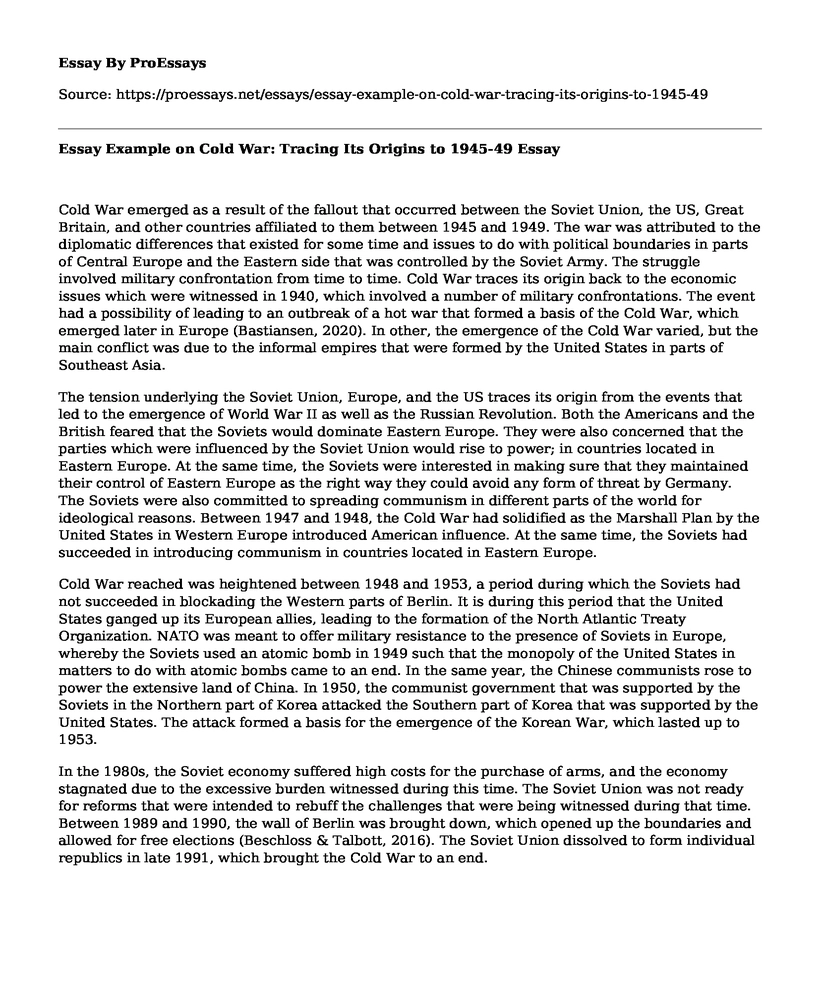Cold War emerged as a result of the fallout that occurred between the Soviet Union, the US, Great Britain, and other countries affiliated to them between 1945 and 1949. The war was attributed to the diplomatic differences that existed for some time and issues to do with political boundaries in parts of Central Europe and the Eastern side that was controlled by the Soviet Army. The struggle involved military confrontation from time to time. Cold War traces its origin back to the economic issues which were witnessed in 1940, which involved a number of military confrontations. The event had a possibility of leading to an outbreak of a hot war that formed a basis of the Cold War, which emerged later in Europe (Bastiansen, 2020). In other, the emergence of the Cold War varied, but the main conflict was due to the informal empires that were formed by the United States in parts of Southeast Asia.
The tension underlying the Soviet Union, Europe, and the US traces its origin from the events that led to the emergence of World War II as well as the Russian Revolution. Both the Americans and the British feared that the Soviets would dominate Eastern Europe. They were also concerned that the parties which were influenced by the Soviet Union would rise to power; in countries located in Eastern Europe. At the same time, the Soviets were interested in making sure that they maintained their control of Eastern Europe as the right way they could avoid any form of threat by Germany. The Soviets were also committed to spreading communism in different parts of the world for ideological reasons. Between 1947 and 1948, the Cold War had solidified as the Marshall Plan by the United States in Western Europe introduced American influence. At the same time, the Soviets had succeeded in introducing communism in countries located in Eastern Europe.
Cold War reached was heightened between 1948 and 1953, a period during which the Soviets had not succeeded in blockading the Western parts of Berlin. It is during this period that the United States ganged up its European allies, leading to the formation of the North Atlantic Treaty Organization. NATO was meant to offer military resistance to the presence of Soviets in Europe, whereby the Soviets used an atomic bomb in 1949 such that the monopoly of the United States in matters to do with atomic bombs came to an end. In the same year, the Chinese communists rose to power the extensive land of China. In 1950, the communist government that was supported by the Soviets in the Northern part of Korea attacked the Southern part of Korea that was supported by the United States. The attack formed a basis for the emergence of the Korean War, which lasted up to 1953.
In the 1980s, the Soviet economy suffered high costs for the purchase of arms, and the economy stagnated due to the excessive burden witnessed during this time. The Soviet Union was not ready for reforms that were intended to rebuff the challenges that were being witnessed during that time. Between 1989 and 1990, the wall of Berlin was brought down, which opened up the boundaries and allowed for free elections (Beschloss & Talbott, 2016). The Soviet Union dissolved to form individual republics in late 1991, which brought the Cold War to an end.
References
Bastiansen, H. G. (2020). Norwegian media and the Cold War 1945-1991. Nordicom Review, 35(s1), 155-170.
Beschloss, M., & Talbott, S. (2016). At the highest levels: The inside story of the end of the Cold War. Open Road Media.
Cite this page
Essay Example on Cold War: Tracing Its Origins to 1945-49. (2023, May 08). Retrieved from https://proessays.net/essays/essay-example-on-cold-war-tracing-its-origins-to-1945-49
If you are the original author of this essay and no longer wish to have it published on the ProEssays website, please click below to request its removal:
- Essay Example - American History and Identity
- Rhetorical Analysis of William Wilberforce's Abolition Speech
- A Journey Through US History: Reconstruction, Gilded Age, & More - Essay Sample
- Essay on Livy's Portrayal of Early Women in Ancient Rome: Weak, Used as Tools, and Always Stimulating Men
- Essay Example on Cold War: Tracing Its Origins to 1945-49
- Essay Example on Mary Eliza: A Trailblazing Black Professional Nurse
- Tim Cook: Journey from Auburn University to Apple CEO - Biography Sample







